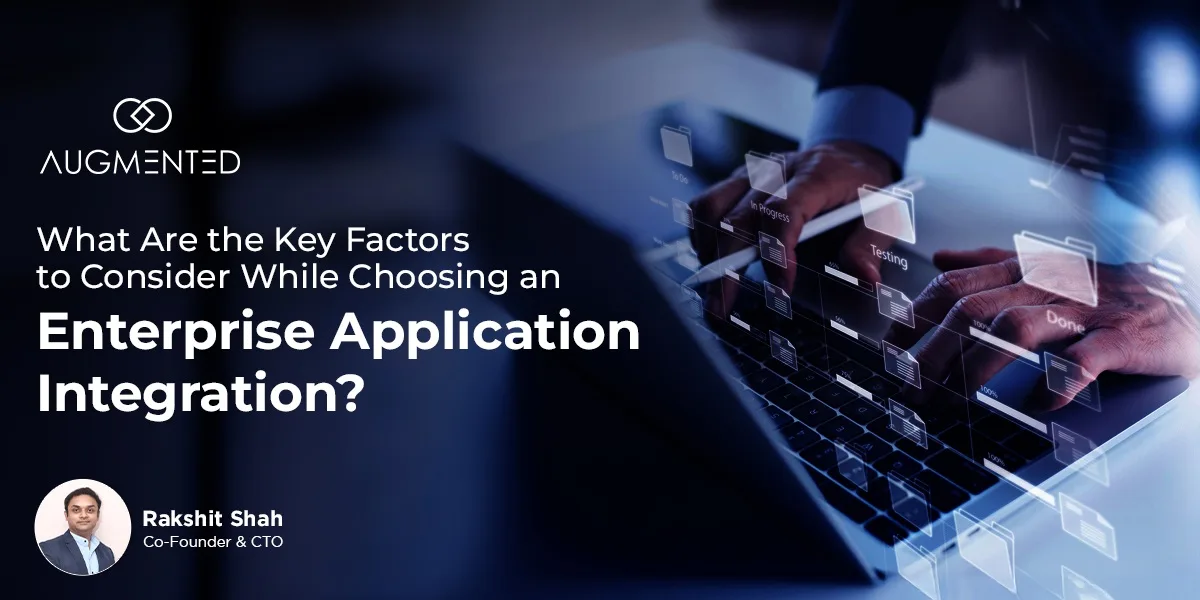Are you left with disconnected systems, data silos, inconsistencies and duplicates? Are these gaps slowing you down and silently killing your business?
Managing multiple applications while juggling core business tasks isn’t easy, but that’s where most organizations are stuck.
So, how do you firefight these broken workflows, processes and systems?
By choosing an enterprise application integration platform that helps you connect all your applications, enables seamless communications, and achieves real-time data flow. (Apart from many other things.)
Ready to eliminate inefficiencies and focus on growth? Dig into this blog to see how a well-selected EAI can transform your business.
Let’s get started.
Why Do You Need an Enterprise Application Integration?
Software applications have become a part of modern businesses. To manage multiple tasks, you rely on various software applications, but the disconnection between these applications makes you juggle, taking most of your valuable time.
That’s where application integration comes in. Application integration solutions provide users with a unified platform to connect multiple applications, allowing users to communicate and share data seamlessly.
Why Enterprises are Inclining Towards Application Integration Solutions?
Did you know? The enterprise application integration market was valued at $55 billion in 2024 and it is expected to reach $89.09 billion by 2031.
The reason for this significant increase?
- Ongoing technological developments
- Widespread adoption of advanced products and solutions across various sectors
- Continous innovations
- Advances in Artificial Intelligence
- Enhanced product efficiency and functionality (and many more.)
The application integration services market is on the brink of a transformative phase of growth. This impending change underlines the increasing importance for enterprises to select the right integration platform, one that can streamline operations and drive efficiency.
To help you make the right choice, we have selected 7 key factors for you to consider before selecting an enterprise application service. Let’s begin.
7 Things to Consider Before Selecting an Enterprise Application Integration
From processed automation to enhanced customer service, application integration services help streamline your tasks, reduce errors and increase business productivity.
Understanding the importance of effective application integration best practices is crucial to ensure seamless access to information for decision-making.
Thus, to enable better connections between various platforms, databases, and applications, we have listed the following seven aspects you may consider before selecting the right application integration for your business.
1. Scalability and Flexibility
The need to integrate more applications and manage large volumes of data increases with your growing business. Thus, choose an application integration solution that is scalable and flexible to your system architecture.
It should be able to handle:
- The additional new software,
- Increased data traffic,
- Complex workflows,
- Support different types of integrations, and
- Accommodate new applications and data sources
Moreover, your chosen software should evolve with technological advances rather than be limited to a rigid structure. It should also offer cloud-based or hybrid deployment options to leverage the advancements of both on-premise and cloud environments.
2. Strong Compatibility
Will the integration solution support your current applications? Will it require custom development?
Before selecting an integration system, ensure it is compatible with your current infrastructure, as the need for custom development, troubleshooting, or system rework could lead to the following:
- Data Silos
- Communication Breakdowns
- Higher Operational Costs, and more.
Ensure that it works with your existing ERP, CRM, HRM, and other business systems. It should not disrupt your current business process or require a complete overhaul of your existing system.
Modern integration solutions provide APIs, connectors, and adapters to smoothly integrate different systems.
However, if the systems do not integrate for real-time data sharing, it may delay your processes. This could also lead to costly custom integrations, manual workloads, operational inefficiencies, custom coding and long-term maintenance challenges.
3. Security and Reliability
For any business, beyond scalability and compatibility comes data security. A robust EAI software prioritizes the security and reliability of your data and integrations(especially when integrating multiple systems that share sensitive information).
Thus, ask yourself the following questions before selecting an EAI service platform.
- Does the platform provide end-to-end encryption?
- Does it protect your data from unauthorized access, beaches and losses?
- How does it ensure data integrity and confidentiality?
- Does it comply with relevant regulations and standards?
- Will the platform provide backup and recovery solutions?
- Does the platform support industry-specific compliance requirements?
Whether it’s customer data, financial transactions, or employee records, the EAI you choose should offer high availability, performance, and fault tolerance. Your EAI’s primary role is to facilitate secure data transfer across systems.
4. Low-Code or No-Code Capabilities
Do you want to drive innovations and efficiency without technical barriers? Are you tired of dealing with bugs and errors? Or maybe you want to empower non-technical users to participate in the integration process
No-code or low-code integration capabilities help you effortlessly create and manage integrations without needing extensive coding skills or technical knowledge.
- Enhance Agility
- Reduce Dependency
- Accelerate Deployment
- Save Time and Resources, and
- Avoid Errors
Explore enterprise application integration services with intuitive interfaces and streamlined integration processes. These services enable you to design, build, and deploy integrations using features like drag-and-drop, pre-built templates and visual workflows.
If you are unsure which platform works best for your business, consider application integration consulting services.
5. Monitoring and Management
How easy is it to monitor, manage, and troubleshoot interactions? It isn’t. An application integration solution should connect apps or systems. But it should also equip you with the tools and insights to monitor and manage your integrations.
These tools should provide you with invaluable insights, from tracking and measuring integration status to alerting you of any issues or errors.
- Intuitive dashboards
- Analytical tools
- Reports and
- Visualizations
The platform you select should be able to understand, optimize and enhance your integration processes and outcomes.
Moreover, it should be easy for technical and non-technical users. A too-complex integration might require expertise, leading to downtime, extended long-term maintenance or external consulting.
6. Cost and ROI
What would you choose? An EAI solution that requires lower initial costs but higher long-term investments or a solution with a higher initial prize but long-term value? Most of you would opt for solution B, Right?
Before deciding on an EAI, it’s crucial to weigh cost-effectiveness and ROI. Find a solution that delivers maximum value to your business, such as
- Reduced operational costs,
- Improved productivity
- Lower ongoing expenses
- Higher efficiency
- Higher return on investment
- Comprehensive features and
- Automated updates
Additionally, factor in both the upfront and ongoing costs, such as software licenses, maintenance, and support. The EAI solution you choose should align with your business goals.
7. User-friendly
No business would want an EAI solution that requires endless training, slower adoption and reduced productivity. It would only lead to disruptions and hinder overall efficiency.
Thus, choose an EAI solution that is easy to adopt and efficient for your organization. One that lets your team quickly learn and use it with minimized downtime and maximum productivity.
An intuitive interface that requires minimal training benefits your business in several ways, including
- Faster adoption
- Less downtime and disruptions
- Immediate integration improvements
- Few support issues
- Significant boost in productivity
A user-friendly integration platform can greatly improve the smoothness and efficiency of connecting software systems and data sources.
However, not all EAI platforms are designed to be user-friendly and easy to configure or maintain. You can seek application integration consulting services to streamline the process.
Moreover, to assist you in making a quick and better decision, we have compiled a list of the top five platforms in 2024.
Top 5 Enterprise Application Integration Platforms 2024
The market for EAI platforms is highly competitive. There are numerous platforms offering a wide variety of integration solutions and services with top-notch features, like data transformation, protocol mediation, API management, and more.
Taking into account their functionality, ease of use, flexibility, scalability and other features, it is difficult to find the one that fits your needs. Thus, here are top 5 platforms of 2024, to help choose the best.
1. APPSeCONNECT
It is an iPaaS (Integration Platform-as-a-Service) platform that focuses on connecting different SaaS, on-premise, cloud applications and system endpoints.
Using this modern and intelligent automation platform, you can connect ERP, Ecommerce, CRM and other platforms into a unified system. Moreover,it focuses strongly on data security and reliability to ensure sensitive data remains secure.
Pricing: Offer different plans, like starter, growth and enterprise.
G2 Rating: 4.4/5
2. Azure Integration Services
Azure integration services include five tools that act as a bridge between on-premise services and cloud applications. These services focus on
- Securing APIs,
- Making them accessible,
- Streamlining workflows,
- Connecting departments through communication, and
- Automating and managing team tasks.
You can use these integration solution tools separately or in different combinations to accomplish various organizational goals.
Azure integration services simplify the work for developers and teams by handling complex tasks and streamlining them with essential components.
Pricing: You can evalue the pricing using their Azure pricing calculator and a TCO calculator.
G2 Rating: 4.4/5
3. Boomi
Boomi specializes in Integration Platform-as-a-Service (iPaas), API management and data solutions. It helps organizations automate their business processes through application, database and API integrations.
- It speeds up processes with built-in intelligence
- Supports role-based access
- Is user-friendly, and
- Scalable and secure
- Automates workflows and processes
The platform streamlines data integration with pre-built connectors that simplify data exchange across cloud, on premises and edge environments.
Pricing: Flexible pricing for all businesses
G2 Rating: 4.4/5
4. IBM App Connect Enterprise
IBM helps businesses connect applications and systems to unlock critical data quickly and securely. With IBM, you can quickly connect SaaS applications and build workflows using pre-built connectors and customizable templates.
It has a no-code interface with a drag-and-drop system for easy integration creation. IBM also supports complex integrations with various programming languages and management tools.
Pricing: Offers a 30-day free trial
G2 Rating: 4.3/5
5. Workato
Workato is one of the most advanced integration platforms. It offers custom integrations with over 1,000+ SaaS apps, databases, ERPs and more. Businesses can optimize their operations both in the cloud and on-premises.
Its cloud native designs, low-code/ no-code environment, and simple drag-and-drop interface makes it easier to construct APIs and integrations.
Workato also offers a large library of connectors, automation recipes and workbot for scaling governance, error management and build and customize workflows.
Pricing: Offers a free trial
G2 Rating: 4.7/5
Remove data silos, improve customer experience and simplify business processes with enterprise application integration platforms.
Conclusion
Enterprise Application Integration is crucial for seamless data exchange in today’s business world. Selecting the right solution requires a thorough understanding of your organization’s current and future needs.
A well-chosen EAI will support your long-term growth and adaptability in an ever-evolving digital world. For more technology-driven solutions, contact our experts at Augmented Systems.


